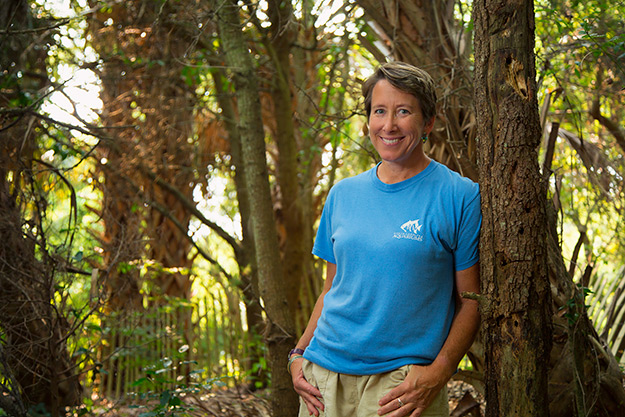Coastal Care

When visiting the coast, the usual city greenery takes a backseat to the beauty of the ocean and rolling sand dunes. Yet, at the North Carolina Aquarium at Fort Fisher, plant and aquatic life share the spotlight. The aquarium’s Conservation Horticulturalist Melanie Doyle cultivates a landscape of lush greenery that thrives in the salty, ocean air.
While constructing a plant backdrop for the aquarium is an important aspect of Doyle’s job, the horticulturalist centers much of her career on the concepts of conservation and education.
Doyle has involved herself in numerous community projects, including the Wilmington Tree Commission and Cape Fear Arch Conservation Collaboration. She uses her expertise to teach the importance of using native plant species in local landscaping and the risks of non-native plant species.
“People who love plants, including myself, can be the worst offenders because we’re always looking for something different and something pretty and something new. That’s where the problem comes in,” Doyle says. “You’ve got to do your homework. Because you can still go out and purchase plants that are really problematic. We just encourage people to stick with natives.”
The horticulturalist knows a thing or two about plants and how they interact with wildlife. Born in Omaha, Nebraska, Doyle always had an interest in animals. As a teenager, she volunteered at the local veterinarian’s office and worked as a seasonal zookeeper at the North Carolina Zoo. When the zoo launched a conservation and research program, Doyle was hooked.
“The idea that you can combine zoo work with real life conservation efforts, that was exciting to me,” she says. “That was it. That’s the kind of work I want to do, whether it be in a zoo setting, a reserve setting, the great outdoors, the wild. I didn’t know where the path would lead for sure, but I was very excited about what I was doing.“
Her fascination with horticulture was piqued during her years at the University of Nebraska-Lincoln. While working part time for an extension forester, Doyle’s interest shifted from animals to plants. But the interest in conservation never waned.
She would earn her bachelor’s degree in wildlife biology and later enroll in the University of North Carolina Wilmington to acquire a master’s in biology. In 2001, she accepted her current position at the aquarium. Now, Doyle is pursuing her doctorate in botany from Wake Forest University.
Her educational background has proven useful towards her endeavors in coastal conservation. It’s also served as an effective tool in battling her biggest conservation challenge: beach vitex. This woody shrub was formerly planted along the coast as a dune stabilizer. Plant specialists later realized that it was harmful and threatened the habitats of native dune plants and animals.
To help combat this insidious plant, Doyle serves as a coordinator for the Beach Vitex Task Force – a group committed to controlling its growth. The task force has seen considerable strides in managing the species, and Doyle hopes to share what she’s learned with other coastal communities throughout the nation.
The first step, however, towards that goal is education, she says.
“From the forest to the dunes, the marshes and estuaries, it’s about having a light footprint. I think a lot of that begins with understanding and appreciating what’s here and acknowledging how amazing our coast is and how complex it is,” Doyle says. “The goal is to teach folks to appreciate the native plants.”
To view more of photographer Chris Brehmer's work, go to www.chrisbrehmerphotography.com